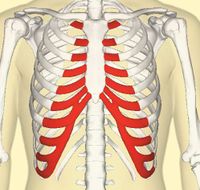Costochondritis

Costochondritis or costosternal syndrome or costosternal chondrodyniais is inflammation of the cartilage that connects a rib bone to the sternum (breastbone) causing chest pain. Sometimes the joint pain is so severe it can mimic a heart attack. When swelling accompanies the pain, it is known as Tietze syndrome.[1] Medical attention should be sought if a patient experiences fever, painful areas of the person's chest looks swollen, red, and feel warm to the touch, they cannot sleep because of the pain.[2]
Symptoms
It can feel like stabbing, burning, aching, confined to one spot, usually in the very center of the chest, but it may radiate outward.[3]
- Occurs on the left side of the breastbone
- Is sharp, aching or pressure-like
- Affects more than one rib
- Worsens when taking a deep breath or coughing[3]
Etiology
Although the cause of costochondritis is unclear it can at times be caused by the following:
- Injury A blow to the chest is one example.
- Physical strain Heavy lifting, strenuous exercise and severe coughing.
- Arthritis Osteoarthritis, rheumatoid arthritis or ankylosing spondylitis.
- Joint infection Viruses, bacteria and fungi — such as tuberculosis, syphilis and aspergillosis — can infect the rib joint.
- Tumors Noncancerous and cancerous tumors can cause costochondritis. Cancer might travel to the joint from another part of the body, such as the breast, thyroid or lung.[1]
- Fibromyalgia[3]
Risk factors
- Costochondritis occurs most often in women and in people older than 40.
- Tietze syndrome usually occurs in teenagers and young adults, and with equal frequency in men and women.[1]
Diagnosis
A doctor will ask about signs and symptoms. A physical exam will involved your mid-chest area being touched and possibly move your arms to see if it causes pain.[2]
Treatment
Costochondritis pain may go away without any treatment and this can take about a year. Treatment depends on the cause.
- Acetaminophen: This medicine decreases pain. Acetaminophen is available without a doctor's order. Ask how much to take and how often to take it. Follow directions. Acetaminophen can cause liver damage if not taken correctly.
- NSAIDs: such as ibuprofen, help decrease swelling, pain, and fever. This medicine is available with or without a doctor's order. NSAIDs can cause stomach bleeding or kidney problems in certain people. If you take blood thinner medicine, NSAIDs may not be safe for you. NSAIDs are not for use in children under 6 months of age without direction from the child's healthcare provider.[2]
A patient may do the following to help with the pain:
- Rest: Do not carry a pocketbook or backpack if it causes pain. Avoid weightlifting during recovery.
- Heat: May help with pain in some patients. Apply heat 20 to 30 minutes every 2 hours for as many days as directed.
- Ice: Decrease swelling and pain and may also help prevent tissue damage. Use an ice pack, or put crushed ice in a plastic bag. Cover it with a towel and place it on the painful area for 15 to 20 minutes every hour or as directed.
- Stretching exercises: Gentle stretching may help symptoms. Stand in a doorway and put your hands on the door frame at the level of your ears or shoulders. Take 1 step forward and gently stretch your chest. Try this with your hands higher up on the doorway.[2]
Notable research
See also
Learn more
- Costochondritis - Symptoms and causes - Mayo Clinic
- Costochondritis: What It Is, Causes, FAQs & Treatment - Cleveland Clinic
References
- ↑ 1.0 1.1 1.2 "Costochondritis - Symptoms and causes". Mayo Clinic. Retrieved January 27, 2020.
- ↑ 2.0 2.1 2.2 2.3 "Costochondritis - What You Need to Know". Drugs.com. Retrieved January 27, 2020.
- ↑ 3.0 3.1 3.2 "Can fibromyalgia cause chest pain?". Medical News Today. Retrieved January 27, 2020.
- ↑ Prouix, Anne M; Zryd, Teresa W (September 2009). "Costochondritis: Diagnosis and treatment". American Family Physician. 80 (6): 617–620.
- ↑ Schumann, Jessica A.; Parente, John J. (2020). Costochondritis. Treasure Island (FL): StatPearls Publishing. PMID 30422526.

